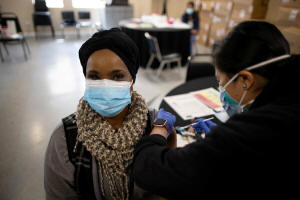Clinics across U.S. bring expertise, community connections to vaccine
drive
 Send a link to a friend
Send a link to a friend
 [March 19, 2021]
By Lisa Baertlein [March 19, 2021]
By Lisa Baertlein
(Reuters) - In the days before an east Los
Angeles COVID-19 vaccination site opened in a Latino neighborhood that
was hard-hit by the pandemic, people flooded California's online booking
system to snap up appointments. The software accepted hundreds of
ineligible residents from wealthy enclaves such as Beverly Hills.
Jim Mangia, chief executive of St. John's Well Child & Family Center,
said not one of the first 300 people to book an appointment lived in an
east Los Angeles ZIP code and many were not eligible under existing
guidelines for age and occupation.
Mangia unplugged the site from the state's My Turn online system. Then
15 staffers spent two days calling ineligible people to cancel
appointments. Food service union officials and local immigration support
groups helped recruit eligible residents. Four outreach workers walked
the streets for hours, talking with people and posting flyers emblazoned
with a phone number for scheduling vaccine appointments.

Such low-tech, shoe-leather strategies are informed by on-the-ground
data that government-funded community health clinics such as St. John's
have been collecting for decades.
President Joe Biden announced in February that he was turning to the
expertise and deep community connections of the more than 1,300 such
clinics across the country. As part of a strategy to increase
vaccinations in communities devastated by coronavirus, administration
officials reached out to clinics in every state, where staff know that
the impoverished Latinos and Blacks they serve are being vaccinated at
about half the rate of whites - despite being at least twice as likely
to die from COVID-19.
Reuters spoke with a dozen clinics in Los Angeles, Oakland,
Philadelphia, Detroit, Miami and Birmingham, Alabama, that are getting
vaccines into the arms of people who have trouble securing appointments
via overrun internet booking systems or getting to mass vaccination
sites due to lack of technological savvy, time or transportation.
The clinics offer low- to no-cost medical services to almost 30 million
people across the country – including essential workers who harvest,
sell and cook food; clean homes and hospitals; and care for children,
the disabled and elderly. In its first four days, St. John's inoculated
1,400 people in east LA - among them food cart vendors, housekeepers and
gardeners, Mangia said.
The United States is in a race to rollout vaccines as more contagious
variants of the virus are discovered, posing a new threat to areas where
infection rates are highest.
'HOW EQUITY GETS IGNORED'
States including California and Texas redact information about race and
ethnicity when they report vaccination data, citing patient privacy.
That results in an incomplete picture that hobbles efforts to identify
gaps, guide ongoing policies and direct resources to areas beset by
entrenched medical inequities.
As of Thursday, the CDC only had race and ethnicity data for 53% of the
roughly 74 million people who have received at least one vaccine dose.
Within that group, 66% were white, almost 9% were Hispanic or Latino and
nearly 8% were Black, the data showed.
"Often times this is how equity gets ignored – because it just doesn't
get measured in the first place," said Dr. Abdul El-Sayed, an
epidemiologist and former director of Detroit's health department.
[to top of second column]
|

Marla Brandon-Stewart receives a second coronavirus disease
(COVID-19) vaccination, in Los Angeles, California, U.S., March 12,
2021. REUTERS/Lucy Nicholson

The federal government requires the community clinics it funds to
collect race and ethnicity data. But they had vaccinated relatively
people few before the latest push - 370,079 shots as of March 5.
The community clinics use robust patient data to bolster vaccination
campaigns. Their staff are also trusted healthcare providers who can
help dispel hesitancy toward the vaccine in vulnerable communities
that is rooted in distrust of the government and historical episodes
of medical exploitation.
AltaMed Health Services, one of the nation's largest community
clinic operators, uses records from its roughly 300,000 Southern
California patients to create lists of eligible patients. Dr.
Sherrill Brown, its medical director, said staff then reach out via
text and email.
"We try to bombard them with the information so that they have as
many opportunities as they can to schedule an appointment," Brown
said.
Philadelphia's Public Health Management Corporation identified
12,000 vaccine-eligible patients at its five federally funded
clinics and added a special phone tree for vaccine calls. The
Philadelphia clinics are inoculating unsheltered patients, public
housing residents and teachers at schools for students with special
needs.
Alabama's mostly Black north Birmingham, a neighborhood grappling
with poverty and health problems linked to steel plant pollution,
got its first vaccines after the Biden administration intervened.
Alabama Regional Medical Services, a community clinic serving the
area, on Saturday started vaccinating its own patients and residents
referred by local ministers and public housing groups.

"We're going to clear the backlog for the 35207 ZIP code," said
Christopher Mosley, its outreach director, referring to local
demand.
Federally allocated vaccines are also starting to flow into metro
Detroit, Michigan, said Anthony King, CEO of the Wellness Plan, a
clinic operator in the city that is a hot spot in the state with the
nation's highest infection rate.
Meanwhile, California doubled doses shipped to clinics in
neighborhoods where COVID-19 cases and death are highest, and
quickly vaccinated 400,000 of its most vulnerable residents.
"That's how it should have been all along," said Dr. Jerry Abraham,
who leads the vaccine team at Kedren Community Health Center, which
serves south-central Los Angeles' Latino and Black communities.
As he spoke, security guards waved seniors through its main
checkpoint for no-wait inoculations.
(Reporting by Lisa Baertlein in Los Angeles; Editing by Donna Bryson
and Daniel Wallis)
[© 2021 Thomson Reuters. All rights
reserved.] Copyright 2021 Reuters. All rights reserved. This material may not be published,
broadcast, rewritten or redistributed.
Thompson Reuters is solely responsible for this content. |